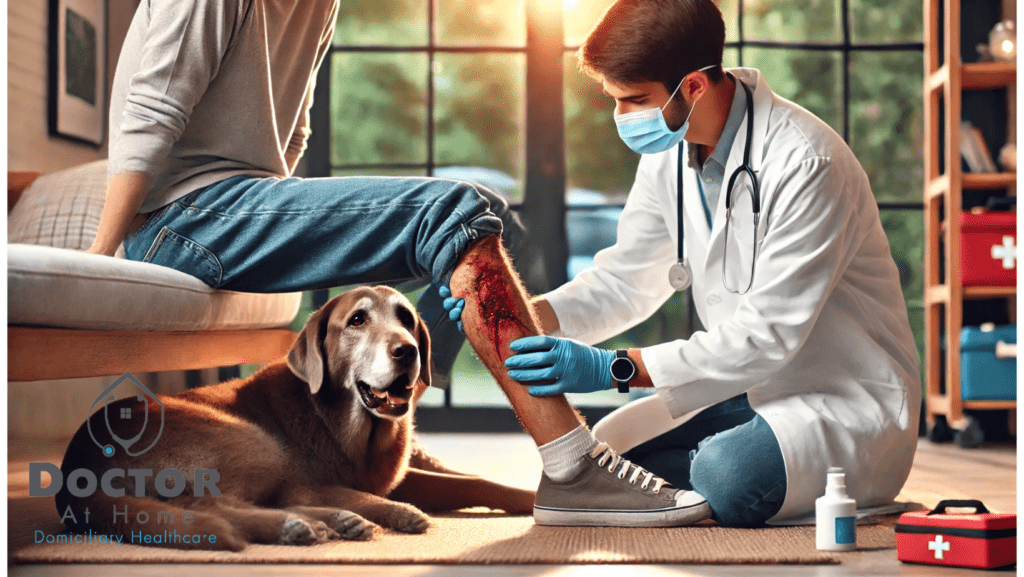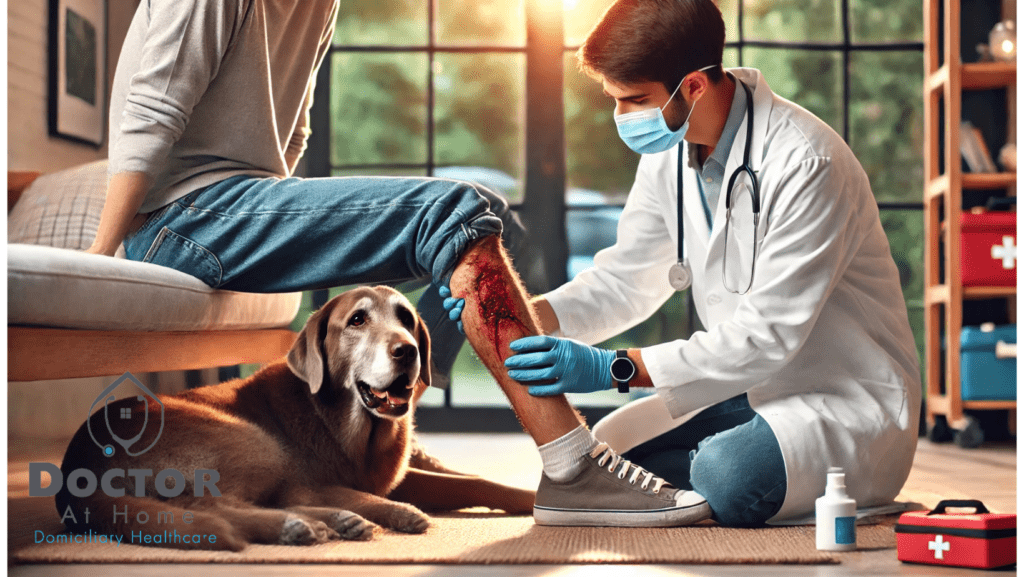

A dog bite can happen at any time, posing potential health risks, from infections to rabies transmission. This article provides a comprehensive guide on how to act after a dog bite, when to seek medical help, and what vaccines may be required. Knowing how to identify risks and respond in time can make a big difference in recovery and prevent complications.
What to Do If a Dog Bites You
- Wash the wound immediately: Use soap and water to reduce infection risk. Wash for at least 5 minutes and rinse thoroughly.
- Disinfect the area: Apply an antiseptic to prevent bacterial infection.
- Control bleeding: If the wound is bleeding, apply a clean cloth to apply pressure. If the bleeding doesn’t stop, seek medical attention immediately.
- Cover the wound: Use a sterile bandage and change it daily or when it’s dirty or wet.
What Are the Chances of Contracting Rabies?
Rabies is a serious viral disease primarily transmitted through the saliva of infected animals, including dogs. Although bites from vaccinated domestic dogs carry a low rabies risk, stray dogs or those without a vaccination history could carry the virus. In Mexico, the risk of rabies is low due to pet vaccination programs, but rabies remains a deadly disease if left untreated.
When and Who Should Get the Rabies Vaccine?
Recommendations for rabies vaccination depend on the type of exposure and the condition of the biting dog. The rabies vaccination regimen consists of a series of doses, administered as follows:
- Bites from stray or unknown dogs: If the dog is stray or unknown and cannot be observed, treatment should start immediately. The rabies vaccine is administered in five doses to ensure effective protection:
- Day 0: First dose (immediately after the bite).
- Day 3: Second dose.
- Day 7: Third dose.
- Day 14: Fourth dose.
- Day 28: Fifth dose.
- Bites from vaccinated pets: In these cases, rabies vaccination is generally unnecessary. However, observing the dog for at least 10 days is essential to ensure it shows no signs of rabies.
- High-risk individuals: Children, older adults, and people with weakened immune systems should receive a detailed medical evaluation to determine the need for the vaccine. In certain cases, the doctor may recommend the complete five-dose regimen as a precaution.
What Vaccines Do I Need If a Dog Bit Me?
In addition to the rabies vaccine, other vaccines may be necessary after a dog bite, depending on the circumstances:
- Tetanus vaccine: Dog bites can introduce bacteria, and the tetanus vaccine may be needed if you haven’t had a booster in the last five years.
- Prophylactic antibiotics: In certain cases, the doctor may prescribe antibiotics to prevent common bacterial infections from bites.
When to See a Doctor?
It is important to consult a doctor in any of the following situations:
- The bite is deep, bleeds heavily, or affects the face, hands, or genitals.
- The bite is from a stray or unvaccinated dog.
- The bitten person is a child, older adult, or has a weakened immune system.
- Signs of infection, such as redness, swelling, warmth, or pus, appear.
- More than five years have passed since the last tetanus shot.
Dog Bite Complications
Dog bites can result in complications that range from mild to severe:
- Bacterial infections: Bacteria in the dog’s mouth, like Pasteurella, Staphylococcus, and Capnocytophaga, can cause serious infections, especially if the wound wasn’t cleaned properly.
- Rabies: Though uncommon in vaccinated pets, rabies is still a deadly complication if left untreated.
- Tetanus: This risk increases with deep wounds or if the tetanus vaccine is not current.
- Nerve damage or scarring: Deep bites in delicate areas can affect nerves or leave permanent scars, sometimes requiring surgical intervention.
Conclusion
In the case of a dog bite, acting quickly and seeking medical attention can prevent serious complications. Understanding the risks of rabies, tetanus, and other infections is essential to making informed decisions about vaccines and treatment. Prompt evaluation and proper follow-up care are key to minimizing the effects of a dog bite.
